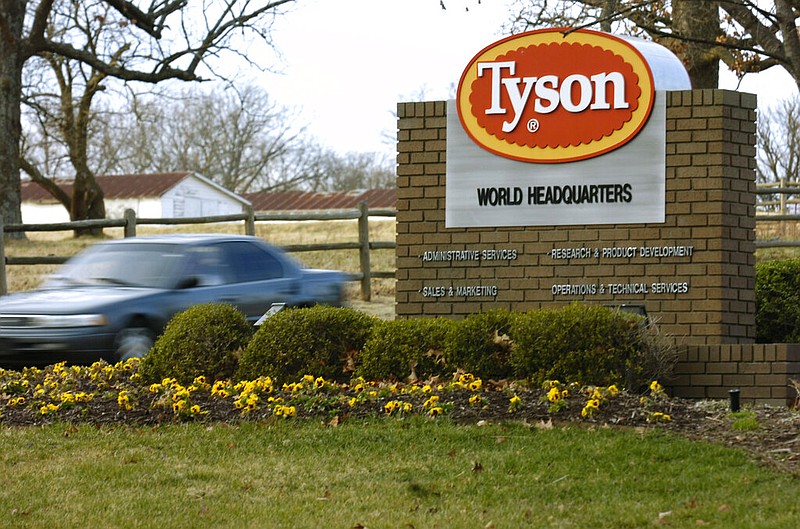Tyson Foods on Monday reported 2021 fourth-quarter earnings of $1.36 billion, more than twice the amount earned in the same period last year.
Tyson sold less beef, chicken, pork and prepared-foods items in the three months that ended Oct. 2 compared with the fourth quarter last year, but commodity price increases more than made up for the losses. Average prices of beef and pork rose 32.7% and 38%, respectively.
Sales increased 12%, to $12.81 billion, on record beef results and on growth as restaurants continue to recover from covid-19 restrictions.
Alan Ellstrand, associate dean of the Walton College of Business in Fayetteville, said the report was unusual but consistent with inflationary pressures seen across the country. On the surface, he said, Tyson's sales and profit numbers looked good because of price increases rather than sales volume.
Ellstrand said he was surprised to see commodity prices spike while prepared-foods prices remain muted.
"To see prices go that high year-over-year is really remarkable," he said.
To offset some of the inflationary pressures, Tyson said it is rolling out a new productivity program with the goal of finding $1 billion in savings by 2024 through changes designed to make the company "better, faster and more agile."
The nation's largest meat producer also has 12 production plants under construction to meet growing demand.
Donnie King, Tyson's president and chief executive officer said the company delivered strong results from its core line of products, including Jimmy Dean and Hillshire brands, but continues to face labor and supply chain headwinds.
The industry is experiencing higher meat, grain and transportation costs, on top of labor challenges that limit production. King said Tyson is taking steps to address these concerns and staff more of its processing plants.
"The safety of our team members continues to be our No. 1 priority," King said during a conference call Monday with industry analysts. Coronavirus expenses such as vaccines, testing and protective equipment cost Tyson $65 million.
In Tyson's beef segment, sales grew 17% to $5 billion from a year ago. Volumes were down 15%, offset by price increases. Operating income nearly tripled to $1.15 billion with 23% margins.
In the pork segment, sales grew 20% to $1.65 billion. Volumes were down 18%, offset by price increases. Operating income fell 55% to $78 million. Margins were 4.7% compared with 12.7% a year ago.
For the most part Tyson's earnings performance exceeded expectations. According to a FactSet consensus, analysts estimated adjusted earnings of $2.22 per share, 8 cents off Tyson's adjusted $2.30 per share.
The company fell short of Stephens Inc's lofty earnings estimate of $2.63 per share. Analyst Ben Bienvenu said in a research brief that this was driven by lower-than-expected operating margins, a higher tax rate and other expenses.
In the chicken segment, sales grew 13% to $3.87 billion. Volumes declined 6%, offset by a price increase of 19%. Negative margins resulted in an operating loss of $136 million compared with a profit of $86 million last year.
A decline in hatch rates, as well as severe weather and labor issues affected volumes. Increased costs and expenses, including a $325 million gain in feed costs, net derivative losses and a $23 million expense related to a fire at a production plant affected income.
In the prepared foods segment, sales declined 1% to $2.25 billion. Volumes fell 12.5%, offset by a price increase of 11%. Operating income more than tripled to $823 million on margins of 36.5%. This came from the $784 million sale of Tyson's pet treats business.
In the international segment, sales grew 11% to $546 million. Volumes increased 3% and prices increased 8%. This resulted in a loss of $3 million compared with a loss of $13 million last year.
Looking ahead, King said the company has strong momentum and expects better returns for Tyson investors.
Tyson reported fiscal 2021 income of $3 billion, a 48% gain from the previous year.
For the 12 months that ended Oct. 2, income was offset by increased costs and legal fees.
Sales grew 9% to $47 billion because of strong beef results.
Tyson shares rose $2.88, or 3.6%, to close Monday at $84.11 on the New York Stock Exchange.
